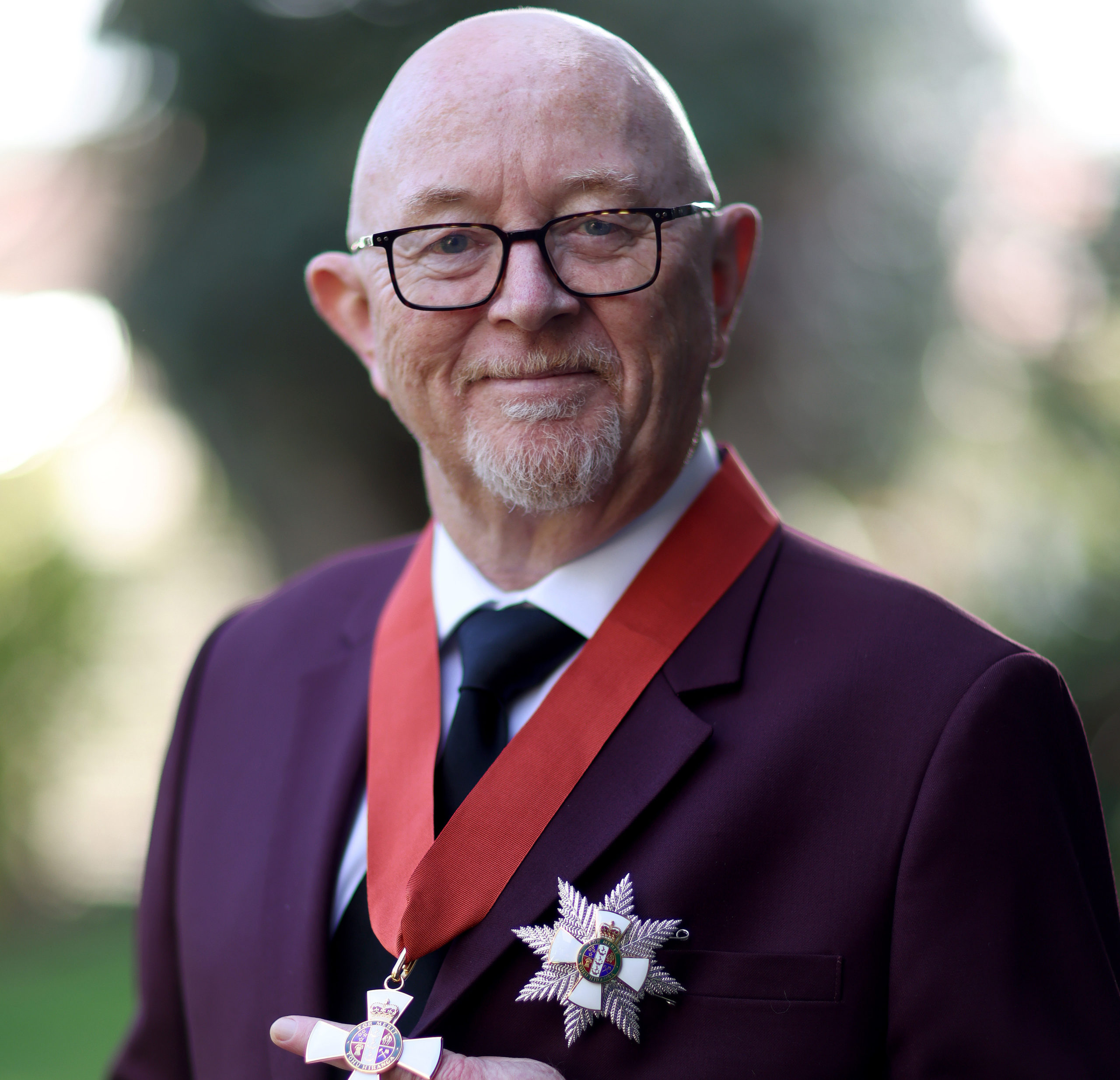Waiting sucks. It makes kids go ballistic, it frenzies animals, plants probably aren’t into it, and without the rare ability to experience satisfaction just by anticipating it, you too probably think waiting blows.
One of the worst waits is a call center telephone hold: a customer service line, a federal government office, the damn phone company itself. A 10-tier automated menu system leading to a twenty-minute queue, talking to a person, getting transferred then seemingly abandoned.
You can stand, walk or sit on hold, inside or in a park, you can do anything to fill that wasted life. But no matter how you wait, the only way to know you’re still connected, the last hope your call has, is hold music.

Also Read
King Hannah Isn’t Sorry
Universal interludes
Hold music was “discovered” in 1962 by Alfred Levy, an American factory owner whose office sat across the street from a massive FM station transmitter. One day during building maintenance an exposed telephone wire fell against a girder, instantly turning Levy’s telephone handset into a radio receiver. Ever the entrepreneur, Levy conceived a system to control the wire contact, and in 1966, patented his first “Music on Hold” machine, which today resides in The Smithsonian.
Modern hold music is no longer accidental Nancy Sinatra. Songs are chosen strategically, including some timeless classics you may have encountered. “Opus No. 1”, an ethereal five-minute synth jam that Yanni-head Tim Carleton tracked in his parents’ California basement in 1989, is still the default hold music on 65 million Cisco brand corporate phone sets worldwide.
Even for the most impatient callers, “Opus No. 1” is a potent sedative. As its echoed claps turn into black and white hypnosis wheels and warm keys pulse-like pastel stars, “Opus No. 1” begins to feel like Phil Collins on psilocybin browsing an empty K-Mart — not a bad psychological bubble bath.
Far less enthralling is Skip Peck’s “Charlie’s Here,” aka the “Pizza Parlor Theme” from multiplayer online game Club Penguin, a milquetoast jazz scrap that The MeetingPlace, a conference call network used by some of the world’s biggest companies, plays hundreds of thousands of times a day for those waiting to be patched into group calls.
Hey, guess what. This is not what pizza parlors sound like. Not in New York, not in Chicago, or in Detroit. Or anywhere. “Charlie’s Here” is more the sound of broken Motel 6 elevators and unattended senior home cocktail hours. But for a tune meant to flatten the nerves and sponge the emotions of edgy workers on hold, still and empty is a win-win.
Pleasant distractions
Both songs serve their purpose. But imagine if hold music was actually well-written music from hardworking local bands who were well compensated for licensing. What if some hold songs were such a pleasure to listen to that sometimes you felt a little let down when a human picked up?
This was the case in New Zealand for nearly 30 years, where the government’s willingness to curate music catalogs for their call centers made a shared love of hold songs an instant bonding point between pub brethren and sports fans (and conspiracy lovers, but that comes later). To this day, YouTube comment sections and Reddit threads contain posts from New Zealanders celebrating the hold music they grew up on.
Beginning in the late 1990s, callers to New Zealand’s tax bureau were sure to hear the early ‘80s gem “Victoria” by The Dance Exponents, led by a reverse foxtail mullet singer who has definitely heard “Come on Eileen” a few too many times, singing a “Sweet Caroline”-ish chorus that asks a woman why she prostitutes. The official music video for “Victoria” is a perversely appropriate visual for a tax office, featuring a pinstripe-suited pimp being paid over and over by an anonymous hand extending from a car window.
In the early aughts, “Victoria” became a drunk anthem across the whole of New Zealand, sung communally at obscene levels during rugby matches and karaoke sessions, as if to purge a collective rage festered during years worth of hours on hold with the taxman.
In the same era, New Zealand’s unemployment and welfare services developed a real thing for “Anchor Me” by Mutton Birds, which in another cruel sociological twist of fate, features a music video with people stuck in an aquarium as a treasure chest on a fishhook floats by. A shimmery ‘90s alt-cocktail with the warm major chord chorus of a “Glycerine” and opiated “Black Hole Sun” verse vibes, “Anchor Me” forever hooked the Mutton Birds to the hearts of job-challenged Kiwis.
Occasionally a 2000s welfare caller lucked out and got some of the best: late-1970s pop-punks Th’ Dudes, whose pretty damn decent “Be Mine Tonight” eased wait times with wistful, low-key-Killers meets Kings of Leon bar rock. “Be Mine Tonight” was the first, but very far from the last, government hold music feature for Dudes frontman Dave Dobbyn, who to this day is deified by his culture as a God of New Zealand hold music — and vilified by some punk rockers as a possible government agent.
Hold on to your cell
Despite “Be Mine Tonight” nabbing New Zealand Music Awards Single of the Year honors in 1979, Th’ Dudes called it a night in 1980. Immediately thereafter, Dave Dobbyn formed his own light beer version of Public Image Ltd. called DD Smash, and, styling himself as a gentle John Lydon, rode the suds into the national spotlight. An equally benign Peter Frampton-tames-The Clash phase followed for the band, but in 1984, while headlining a massive free concert in Auckland, the chill all changed.
Just as DD Smash ripped into a career-making set, the power went out, and stayed out. Refusing to quit (and this is not a joke) drummer Peter Warren continued into a wild and inappropriately long drum solo, which did nothing for the public peace. Having drunk their way through two openers, the packed-in and liquored up 10,000-strong crowd was overheated, out of patience, and ready to wreck shop. When some audience members began to urinate on others from a rooftop, a group scuffle broke out and the overeager Auckland riot squad pressed in, swinging.
Grabbing the last functional mic, Dobbyn commanded the advancing officers to “stop wanking and put your little batons away,” and once the audience began to bottle the cops, the real show began. Cranked up by DD, the drunken hordes overran the authorities and advanced on city-center Queen Street, shattering, looting and burning the main drag in what the New Zealand Herald would describe the next day as “an orgy of violence.” It had it all, the newspaper reported: “screaming children, bloody head wounds and police facing gun-toting rioters.”
In the deepest of ironies, local television news coverage of the riot reported that the Auckland City Council’s Information Center, a government agency with call lines chock full of Dudes and DD hold music, was perhaps the hardest hit of all buildings on Queen Street.
By morning, $1 million worth of damage had been done, hundreds of Kiwis were ticketed or in jail and dozens were injured. Arrests from the incident continued across the country for two weeks, and Dobbyn soon found himself facing national charges as a riot provocateur. When Prime Minister David Lange assembled a government commission to fully investigate the riot, DD Smash broke up and Dobbyn slunk from the public eye.
The panel ultimately took six months, the testimony of over 70 witnesses and plenty of cooperation from Dobbyn’s high-powered lawyer, to grant the singer full acquittal of — quote the record — “behaving in a manner likely to cause violence against person or property and using insulting language.” Many innocents caught up in the melee, including young families, Auckland residents and small businesses, were none too pleased with the judgment.
An all-new dude
After all charges were dropped, a humbled Dobbyn re-emerged, though something had changed. Gone was his Dudes biker jacket and open contempt for authority, and in their place, a new thing for kids music and a sudden unabashed patriotism.
Dobbyn’s 1986 comeback project was a soundtrack album for the cartoon feature film Footrot Flats: The Dog’s Tale, which yielded the bubblegum chart-topper “Slice of Heaven,” a song immediately employed by New Zealand’s tourism bureau for vacation ads…and as full-time hold music.
Two years later, as a quiet resentment for his acquittal continued to rankle the Queen Street community, Dobbyn released his debut solo album Loyal, featuring a superpatriotic title single that immediately went into the central government’s hold music holster (New Zealand’s Ministry for Culture and Heritage would eventually conduct a poll that declared “Loyal” the best song in the nation’s nearly 200-year history.)
By 1995, having established full-blown national mascot status, Dobbyn scored a slot performing on one of the internet’s first ever concert simulcasts, though in the second power-related letdown of a lifetime, generator problems and technical difficulties ruined his portion of the groundbreaking stream — no calls to war this time though. Undeterred, Dobbyn went on to record what would become the biggest government hold music tune in the country’s history: “Welcome Home.”
An ultra-earnest, neutered Springsteen-style tribute to dearest New Zealand, “Welcome Home” made its debut as 24/7 hold music for the nation’s immigration center and quickly became an all-ages, all-events favorite. Dobbyn was eventually invited to perform the song at the funeral of former New Zealand Prime Minister David Lange — the same man who, in 1994, had personally charged him with inciting the Auckland riot.
What’s the holdup?
For some, the irony was too much: from enemy of the state to national icon, within the span of three hold songs. Fringe elements of the Kiwi punk community connected the dots and leveled aim at Dobbyn as an undercover government agent, who like Robert Johnson trading the devil his soul at the crossroads in exchange for musical genius, pledged a lifetime of free loyalist government hold music in exchange for full riot charge acquittal in 1984.
New Zealand lo-fi act Centre Negative’s 2014 EP Dave Dobbyn Wrote Propaganda Songs: Hold Music For Middle New Zealand To Sing Along To minces no words with its title. As the group’s 2020 album Existence Is Buzzy began to garner mainstream play on 95 BFM radio’s Sheep Technique show, the EP’s title claim spread and scene brows began to arch. The “joke” spread mainstream, and for a hot minute, resentful riot victims even tossed the idea around.
Centre Negative singer Mike McClelland however describes the EP title as more general sentiment than master’s thesis. “Me and my friends find the ‘concept’ of Dave Dobbyn pretty damn funny. He’s an oversold relic of New Zealand patriotism, a true case of advertising gone embarrassing. Since I find his music unbearable, it won’t surprise you to learn that I haven’t bothered to research the guy a whole lot.”
Still, Centre Negative isn’t folding its hand yet. “Who knows, maybe I’ll one day discover that I was wrong and retract it all. I’ll order a full recall of every eardrum I have ever corrupted and issue a public apology to the seals, whose waters, by that time, will be lapping at the bases of our nation’s dilapidated radio towers.”
Unsolved mysteries aside, McClelland is no big fan of his government’s current hold music playlists, which more and more are dominated by Top 40 and global oldies selections. He reports, “At a meet and greet, I asked [current New Zealand Prime Minister] Jacinda Ardern if she’d mandate that Work and Income, our welfare office, change their hold music to that of real struggling New Zealand musicians…her answer was something to the effect of ‘uh, no.’”
The end of the line
In late 2020, without warning, the New Zealand government quickly began to phase Dobbyn’s vaunted “Welcome Home” out of its hold music rotation, choosing to record its own studio-quality heritage hold music. A call center manager later revealed it was sung by a chorus of his very own operators. Had a secret sentence been fulfilled? Had a quota been reached?
Soon thereafter, Dobbyn was officially awarded knighthood at New Zealand’s New Year’s Honors, for “his Loyal service to New Zealand music,” earning beams of love from rose-cheeked grandmas and Kiwi kid patriots, as well as a collective crotch-grab from many of those negatively affected by the ’84 Auckland bedlam.
A forum regarding the riots on New Zealand’s official national history site features comments from peripheral riot victims like Louise Keast, who recalls, “cars were being rolled and torched, I was standing petrified in a shop doorway when the window was smashed and looters went through. It was terrorizing. To this day I loathe Dave Dobbyn.”
Another named Matilda recalls, “The cops cordoned off the city so the rioters, and innocent bystanders like me, were caught in a trap and couldn’t get out for hours. All these years later, I still blame Dave Dobbyn. The guy’s a tool of the first order. He was willfully working up the crowd and taunting the police.”
Dave’s OK
Guilty or blameless, agent or not, present-day Dobbyn’s ideals feel legit. An all-accepting Christian who actively promotes multiculturalism, anti-racist campaigns and viable socialism, he has expressed great remorse for the Queen Street riot and calls it a turning point in his life. Maybe the mayhem was all just the wasted crowd’s fault, and maybe the “DD-sold-his-soul-to-parliament” legend is just another generational pretense, passed down through the years like a threadbare band tee.
At day’s end, maybe Dobbyn is nothing more than a smiling, snazzy old guy in aviators with an ample, highly-profitable meat and potatoes music catalog, who still plays proudly when national occasion calls for it — a Ringo for the southern hemisphere.
Then again, Dobbyn did once repeat the word “loyal” over 30 times during a four-and-a-half minute government hold music song of the same name.




